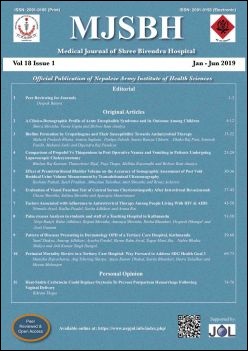Factors Associated with Adherence to Antiretroviral Therapy Among People Living With HIV & AIDS
Keywords:
Antiretroviral Therapy (ART), Adherence, AIDS patientAbstract
Introduction: AIDS and STD is prioritised disease control program of Nepal. Successful treatment of HIV positive patient is fundamental to control the progression to AIDS and ART adherence is crucial for successful treatment. The objective of the study was to find out the factors associated with adherence to antiretroviral therapy among people living with HIV/AIDS.
Methods: Descriptive cross sectional research design was adopted. A total of 195 people living with HIV who were above the age 18 years and taking ARV therapy for at least six months from the ART centre of Sukraraj Tropical and Infectious Disease Hospital were selected by using purposive sampling technique. Data was collected using interview technique with semi structured questionnaire. Collected data was analysed using descriptive and inferential statistics.
Results: The findings showed that 91.28% of the respondents reported perfect adherence (≥95%) and 8.71% of the respondents reported non- adherence. Age (OR: 4.28; CI 1.00-18.26) and marital status (OR: 4.96; CI 1.67-14.75) were the socio-demographic factors associated with adherence to ARV therapy. Number of tablets per day (OR: 10.72; CI 1.21-94.4) and use of reminders tool (OR:11.14; CI 2.35-52.75) were the patient related factors significantly associated with the adherence to ARV therapy. Likewise, experience of no discrimination (OR 3.90; CI 1.11-13.69) and help for the intake of medicine from family members (OR 2.95; CI 1.95-9.19) were the psychosocial factors significantly associated with adherence to ARV therapy. Adherence counselling (OR 13.38; CI 2.99-59.75) and lower travelling cost (OR 3.99; CI 1.40-11.34) were the service factors significantly associated with adherence to ARV therapy.
Conclusions: The prevalence of adherence found in this study was good. Help from the family members, adherence counselling and use of reminders tool for intake of medicine enhanced adherence. Whereas, side effects, alcohol use, burden of pills, experience of discrimination were the barriers for adherence to ART. For improving adherence government and as well as the hospital requires interventions which recognise these barriers.
Downloads
Downloads
Published
How to Cite
Issue
Section
License
This license enables reusers to distribute, remix, adapt, and build upon the material in any medium or format for noncommercial purposes only, and only so long as attribution is given to the creator.




